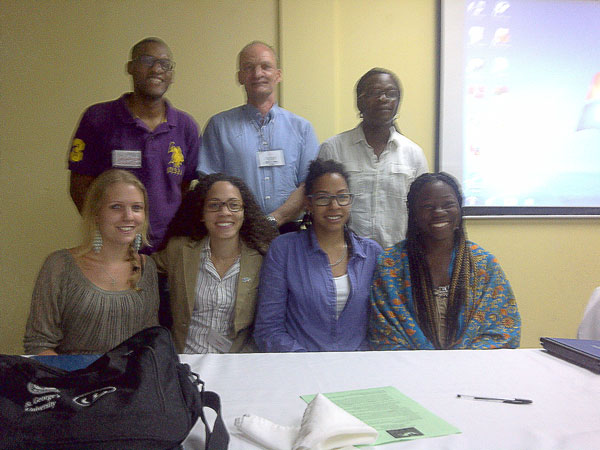 St. George's, GRENADA:--- At the recent 38th annual conference of the Caribbean Studies Association (CSA) in Grenada, Sint Maarten was represented by two officials working on Sint Maarten's development; Arjen Alberts of the Social Economic Council (SER) and Okama Ekpe Brook of the National Development Plan team respectively.
St. George's, GRENADA:--- At the recent 38th annual conference of the Caribbean Studies Association (CSA) in Grenada, Sint Maarten was represented by two officials working on Sint Maarten's development; Arjen Alberts of the Social Economic Council (SER) and Okama Ekpe Brook of the National Development Plan team respectively.
At the conference, entitled "Caribbean Spaces and Institutions: Contesting Paradigms for Development in the 21st Century", running from June 3rd to 7th, the call was unanimous amongst the over 500 participants. Conversations centered around new paradigms for development of Caribbean spaces and institutions. The participants ranged from professors, PhD candidates, deans and faculty, researchers and activists from the public, private and civil society fields. They came from Caribbean, Europe, North and South America, Africa, all to discuss issues relevant to the future development of the Caribbean. Earlier installments of the CSA annual conference took place in Curaçao three times, most recently in 2011, and once in Sint Maarten/Saint Martin in 2001.
The Sint Maarten delegation consisted of Arjen Alberts and Okama Ekpe Brook. Alberts' presentation focused on the nature of the socio-economic development of Sint Maarten compared to that of Aruba over the past three decades, addressing questions of economic growth, immigration and labor productivity respectively. For the future socio-economic development of Sint Maarten, an analysis of labor productivity trends and the question of increasing value added in our most crucial industry is crucial. The comparison to Aruba stems from the fact that both islands, compared to other Dutch and Caribbean territories, are most reliant on tourism in a single-pillar economy, while Aruba started its separate constitutional development roughly 25 years before Sint Maarten. This provided a very useful case for comparative analysis. Alberts' presentation is part of a PhD research project in development studies at the University of Amsterdam facilitated by the Social Economic Council.
Brook chaired a panel on the Millennium Development Goals (MDGs) and also made a presentation. Her presentation focused on measures currently being undertaken by Sint Maarten to provide regional leadership in sustainable development through drafting a National Development Plan. The goal is to use democratic dialogue, a balance between bottom up and top down approach to arrive at a collective national vision and subsequently a plan for Sint Maarten. This model has been successfully applied in other countries by the United Nations Development Program (UNDP) in the past. Sint Maarten is currently the only island in the Dutch Caribbean utilizing this approach to arrive at a national plan. A national development plan is a long term guiding tool that plots the future direction of a country. It provides a framework for all the stakeholders in society to jointly work together to ensure the well-being of a society that seeks a balance between the economic, social, environmental and cultural perspectives. Developing such a plan, as well as its later successful implementation, requires a strong public private partnership between the policy makers, the business and community leaders, academic researchers, media and people with the interest of the country at heart.
Next to the Sint Maarten contributions, of particular interest were experiences garnered from presenters from the Dutch Caribbean region; an Aruban presentation on Alternative Dispute Resolution and Conflict Mediation, and a contribution from Curaçao, with video as a tool for activism. Furthermore, in one of the plenary sessions Francio Guadeloupe, formerly of the University of St. Martin and currently PhD candidate at the University of Amsterdam, lectured on the work of Caribbean author Gordon K. Lewis.
The CSA has been organizing its annual conference since 1975. It is a multi-cultural association that promotes a multi-lingual environment for delegates who participate in its conference hosted annually in different linguistic spaces. For more information: http://www.caribbeanstudiesassociation.org.